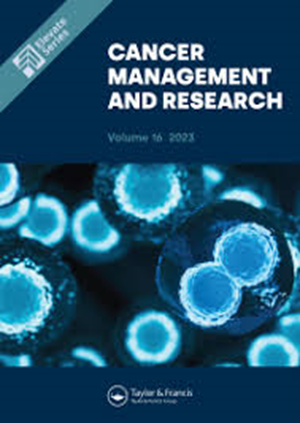食管鳞状细胞癌患者尿液中邻苯二甲酸酯代谢物升高,与癌症晚期和生存率低有关
IF 2.5
4区 医学
Q3 ONCOLOGY
引用次数: 0
摘要
背景:本研究旨在探讨邻苯二甲酸盐在食管鳞癌(ESCC)患者中的作用:本研究旨在探讨邻苯二甲酸盐在食管鳞状细胞癌(ESCC)患者中的作用:方法:共招募了 116 名 ESCC 患者和 58 名无任何已知恶性肿瘤病史的对照组。测量了尿液中所有八种邻苯二甲酸酯代谢物,以评估邻苯二甲酸酯水平。对不同亚组的临床和尿液邻苯二甲酸酯代谢物谱进行比较,以确定差异,同时还研究了邻苯二甲酸酯对ESCC临床结果的影响:ESCC组尿液中某些邻苯二甲酸酯代谢物的浓度高于对照组,包括邻苯二甲酸单(3-羧丙基)酯(MCPP)、邻苯二甲酸单(2-乙基-5-羟基己基)酯(MEHHP)、邻苯二甲酸单(2-乙基-5-氧代己基)酯(MEOHP)和邻苯二甲酸单正丁酯(MnBP)。尿液中邻苯二甲酸酯代谢物浓度较高与临床 T3-T4 状态有关。在单变量分析中,邻苯二甲酸单(2-乙基-5-羧基戊基)酯(MECPP)、邻苯二甲酸单-2-乙基己酯(MEHP)和邻苯二甲酸单正丁酯(MEOHP)浓度较高的患者的1年和2年总生存率(OS)低于这些代谢物浓度较低的患者。多变量分析表明,尿液中 MEHP ≥ 3 μg/L 和临床分期 IVB 是导致较差 OS 的独立预后因素:结论:我们的研究结果表明,ESCC患者尿液中邻苯二甲酸酯代谢物升高,且与肿瘤晚期相关,尿液中MEHP浓度高是OS恶化的独立预后因素。本文章由计算机程序翻译,如有差异,请以英文原文为准。
Urine Phthalate Metabolites are Elevated in Patients with Esophageal Squamous Cell Carcinoma and Associated with Advanced Cancer Stage and Poor Survival
Background: The aim of this study was to investigate the role of phthalate in patients with esophageal squamous cell carcinoma (ESCC).
Methods: A total of 116 ESCC patients and 58 controls without any known histories of malignancies were enrolled. All eight urine phthalate metabolites were measured to assess phthalate levels. Clinical and urine phthalate metabolite profiles were compared between subgroups to identify differences, and the effects of phthalates on clinical ESCC outcomes were also examined.
Results: The concentrations of some urine phthalate metabolites were higher in the ESCC group than in the control group, including mono-(3-carboxypropyl) phthalate (MCPP), mono-(2-ethyl-5-hydroxyhexyl) phthalate (MEHHP), mono-(2-ethyl-5-oxohexyl) phthalate (MEOHP), and mono-n-butyl phthalate (MnBP). Higher concentrations of urine phthalate metabolites were associated with clinical T3–T4 status. Patients with higher concentration of mono-(2-ethyl-5-carboxypentyl) phthalate (MECPP), mono-2-ethylhexyl phthalate (MEHP), and MEOHP had lower 1-year and 2-year overall survival (OS) rates than those with lower concentrations of these metabolites in our univariate analysis. Multivariate analysis showed that urinary MEHP of ≥ 3 μg/L and clinical stage IVB were independent prognostic factors for worse OS.
Conclusion: The results of our study showed that urine phthalate metabolites are elevated in ESCC patients and associated with advanced tumor stage, and that a high urinary concentration of MEHP is an independent prognostic factor of worse OS.
Methods: A total of 116 ESCC patients and 58 controls without any known histories of malignancies were enrolled. All eight urine phthalate metabolites were measured to assess phthalate levels. Clinical and urine phthalate metabolite profiles were compared between subgroups to identify differences, and the effects of phthalates on clinical ESCC outcomes were also examined.
Results: The concentrations of some urine phthalate metabolites were higher in the ESCC group than in the control group, including mono-(3-carboxypropyl) phthalate (MCPP), mono-(2-ethyl-5-hydroxyhexyl) phthalate (MEHHP), mono-(2-ethyl-5-oxohexyl) phthalate (MEOHP), and mono-n-butyl phthalate (MnBP). Higher concentrations of urine phthalate metabolites were associated with clinical T3–T4 status. Patients with higher concentration of mono-(2-ethyl-5-carboxypentyl) phthalate (MECPP), mono-2-ethylhexyl phthalate (MEHP), and MEOHP had lower 1-year and 2-year overall survival (OS) rates than those with lower concentrations of these metabolites in our univariate analysis. Multivariate analysis showed that urinary MEHP of ≥ 3 μg/L and clinical stage IVB were independent prognostic factors for worse OS.
Conclusion: The results of our study showed that urine phthalate metabolites are elevated in ESCC patients and associated with advanced tumor stage, and that a high urinary concentration of MEHP is an independent prognostic factor of worse OS.
求助全文
通过发布文献求助,成功后即可免费获取论文全文。
去求助
来源期刊

Cancer Management and Research
Medicine-Oncology
CiteScore
7.40
自引率
0.00%
发文量
448
审稿时长
16 weeks
期刊介绍:
Cancer Management and Research is an international, peer reviewed, open access journal focusing on cancer research and the optimal use of preventative and integrated treatment interventions to achieve improved outcomes, enhanced survival, and quality of life for cancer patients. Specific topics covered in the journal include:
◦Epidemiology, detection and screening
◦Cellular research and biomarkers
◦Identification of biotargets and agents with novel mechanisms of action
◦Optimal clinical use of existing anticancer agents, including combination therapies
◦Radiation and surgery
◦Palliative care
◦Patient adherence, quality of life, satisfaction
The journal welcomes submitted papers covering original research, basic science, clinical & epidemiological studies, reviews & evaluations, guidelines, expert opinion and commentary, and case series that shed novel insights on a disease or disease subtype.
 求助内容:
求助内容: 应助结果提醒方式:
应助结果提醒方式:


